Our editors independently select these products. Making a purchase through our links may earn Well+Good a commission
The 6 Best Vegan Protein Powders for Boosting Strength and Stable Energy, According to an RD
Explore the best vegan protein powder options for a plant-powered lifestyle. Discover top-rated brands that a dietitian swears by.
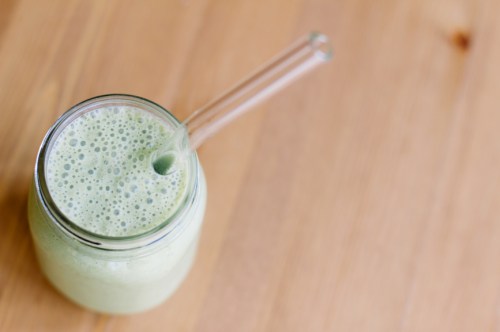
When you think “protein powder,” you might automatically conjure up visions of a gym bro chugging a shake between reps. But thanks to a growing interest in protein-forward diets, more and more of us have taken the plunge into protein supplementation.
Experts in This Article
registered dietitian
A 2023 survey conducted by Cargill found that 29 percent of American consumers said protein is even more important to them than it was the year before. And with the surge of interest in protein comes success for protein supplementation—a market that’s worth an estimated $5.83 billion. And with a concurrent surge in plant-based eating, even vegans can get in on the protein buzz.
In fact, adequate protein consumption can be a challenge with animal-based foods off the table. This is where dietary supplement products like protein powders can actually come in handy. But how do you pick the best vegan protein powder for you? I’ve put on my dietitian hat (so to speak) to share what to look for in a plant-based protein powder and which ones are actually worth your hard-earned dollars.
Should you use vegan protein powders?
Before hopping on the protein powder train, it’s important to take a close look at your diet. While every person will have slightly different requirements depending on a variety of factors (like how active you are), the generally accepted equation to estimate the average person’s needs is to multiply your weight in kilograms by 0.8. This will help you estimate how many grams of protein you need on a daily basis. (Don’t feel like doing math? Try 30 grams of protein per meal as a safe benchmark.)
The reality is that many Americans are eating more than enough protein from whole foods on a daily basis already. And while protein is absolutely good for you (hello, strong muscles and healthy hair and nails), it is possible to eat too much of it. Excessive protein consumption over long periods of time can cause undue stress on the kidneys which are charged with filtering out the nitrogen byproducts of protein metabolism. This can increase a person’s risk of kidney stones.
There’s also some mixed evidence that high-protein diets (particularly ones heavy on the animal proteins) can increase a person’s risk of heart disease and stroke; some studies have found a connection, while more recent ones found that high-protein diets don’t have any impact on heart health.
That said, there are certainly plenty of individuals in this country that may not be consuming enough protein, including:
- People on plant-based diets who eat limited or no animal protein foods
- Athletes (as they need to build or maintain more muscle than the average person)
- People who are pregnant
- Older adults (65 years and up)
In such cases, a vegan protein powder may be beneficial—especially if you’re plant-based or allergic to dairy (since traditional protein powders are made from whey).
PSA: If you think you might have a protein deficiency, it’s important to pay a visit to your health-care provider before making lifestyle changes.
What to consider before buying a vegan protein powder
Once you’ve decided that a vegan protein powder might be right for you, the next step is choosing one to try. Easier said than done. There are thousands of options to choose from, each with packaging filled with confusing claims, uncommon ingredients, and difficult-to-understand nutrition labels. Here are a few things I recommend looking for when choosing a vegan protein powder:
1. Sweetener type
The first thing I look at on a vegan protein powder label is what sweeteners are used. Ideally, your pick doesn’t contain high amounts of added refined sugar—think less than five grams or less per serving.
Many brands use alternative sweeteners, both artificial and natural. While the artificial options like sugar alcohols, aspartame, saccharin, and sucralose are technically considered to be safe for consumption by the U.S. Food and Drug Administration (FDA), there is some concerning evidence surrounding some of them. Otherwise, more natural options like stevia or monk fruit are generally considered to be healthier, safer options, but can be cloyingly sweet and leave a funky aftertaste for some.
2. Organic and non-GMO
Genetically modified organism (GMO)-free and organic options are also very trendy right now, and for good reason. These two descriptors mean that the ingredients in your protein powder were grown without genetic modification and adhere to key organic standards (like no conventional pesticides) to protect your health.
3. Protein source
When it comes to plant-based protein supplements, you’ll find a wide variety different protein sources across brands. These can range from legumes like soy and pea to nuts, seeds, grains, fruits, and vegetables. While options like soy and pea work for many, both are high in fiber and might cause tummy troubles for others, plus soy is a common allergen. So be sure to do your research if you have food allergies or are prone to stomach issues.
4. Third-party testing certification
The FDA does not monitor dietary supplements (like protein powders) in the same way that it does food and drinks. In fact, they don’t require proof of safety or validity from these supplement companies, which then puts the onus back on the companies themselves to follow honest practices. That means there’s a big responsibility on us as consumers to do our research. One easy way to lessen this additional responsibility is to choose supplement products that are third-party verified for safety and validity. Two super reputable organizations that are conducting these tests include NSF and U.S. Pharmacopeia (USP), so be sure to look for their stamps of approval.
5. Flavor
While it may land as obvious, don’t forget that you (and your taste buds) need motivation to knock back a plant-based protein beverage, especially after an intense workout or early in the morning when your stomach may feel more sensitive. Pick a product you actually enjoy consuming.
How much protein powder should you use?
So you’ve got your vegan protein powder…now it’s time to use it. But how much should you use?
For years, nutrition experts have said that the body can only absorb somewhere between 15 and 30 grams of protein at a time. But more studies are needed to prove this, as some researchers say that there is no maximum absorbable amount. Regardless of this conflicting information, I usually recommend a more moderate approach of aiming for no more than 20 or 25 grams at a time. Many protein powders will contain this amount (or more!) per scoop, so it’s key to read the label and not go overboard.
Taking all these factors into account, let’s dive into some of the best vegan protein powders on the market today:
6 of the best vegan protein powders
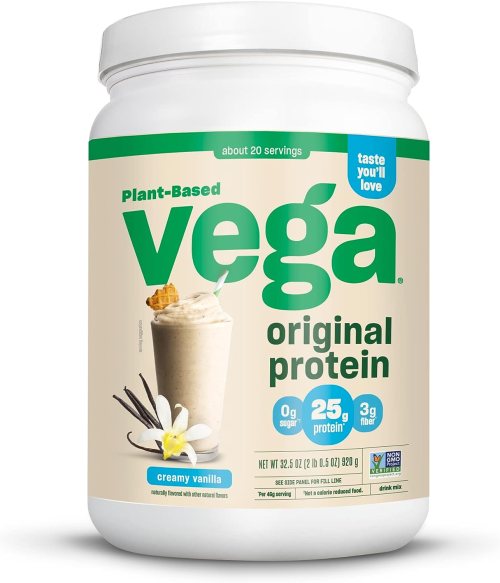
Best overall vegan protein powder: Vega Protein Made Simple Plant-Based Protein Powder — $19.00
When it comes to vegan protein powders, Vega’s Protein Made Simple plant-based protein powder is tough to beat. With only four to eight ingredients (depending on the flavor) free of GMOs, you’ll be hard-pressed to find a less-processed vegan protein powder. The main protein source: Pea protein, which is ideal for folks who have soy allergies. Plus, it tastes great, isn’t chalky, and blends easily into smoothies, oatmeal, chia pudding, pancakes, and more. While it does contain a small amount of cane sugar (five grams per serving), this might be ideal for folks who are put off by the aftertaste (and potential health concerns) associated with artificial sweeteners.
- Sizes: 9.2 ounces (10 servings), 35.7 ounces (38 servings), or 64.1 ounces (70 servings)
- Serving size: 2 scoops
- Protein per serving: 15 grams
- Flavors: Vanilla, chocolate, strawberry banana, caramel toffee
Pros
- Minimal ingredients that most people recognize
- No alternative sweeteners
- Multiple flavor options
Cons
- Contains refined sugar
- Lower protein per serving than other options on this list
Best organic vegan protein powder: Garden of Life Raw Organic Plant-Based Protein Powder — $34.00
While Garden of Life’s Raw Organic Protein Powder’s ingredient list is anything but short, there’s a lot to love about this brand. Its protein blend combines over 10 plant foods (like peas, sprouted grains, and seeds) with enzymes and probiotics for increased digestibility and added gut-health benefits. The flavored options have zero grams of sugar per serving thanks to sweeteners stevia and erythritol. I personally found it a little sweet for my taste, and you might as well. Thankfully, there’s also an unflavored variety that contains no sweeteners whatsoever, allowing it to perfectly fade into the background of whatever you blend it with, thanks to its smooth texture.
Other things to love about this product: not only is it organic and non-GMO, it also has two NSF certifications (one verifying its ingredient profile and one for being gluten-free). This vegan protein powder also contains 4 grams of BCAAs if that’s something important to you. I also love that it has four grams of fiber per serving, a lot more than most other protein powders on the market.
- Size: 19.75 ounces (about 20 servings)
- Serving size: 1 scoop
- Protein per serving: 22 grams
- Flavors: Vanilla, chocolate, vanilla chai, unflavored
Pros
- Protein comes from multiple plant sources
- Gluten-free
- Contains probiotics and digestive enzymes
- NSF Certified
- High in fiber compared to most protein powders
Cons
- Has a very long, hard-to-follow ingredients list
- Contains stevia and erythritol
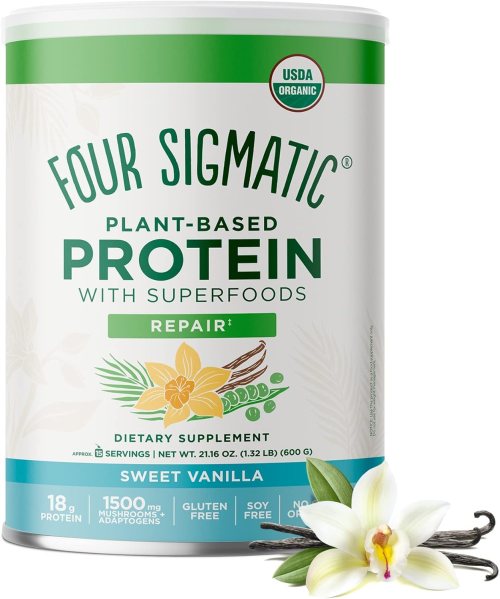
Best adaptogenic vegan protein powder: Four Sigmatic Plant-Based Organic Protein — $50.00
Four Sigmatic’s vegan protein powder aims to offer your body more than just protein thanks to the addition of its signature adaptogenic mushrooms (lion’s mane, reishi, cordyceps, oh my!). Adaptogens help the body adapt to stress over time while also working to improve immunity through inflammation reduction.
This product has a fairly simple ingredients list (rare in a protein powder!) featuring an organic plant-based protein blend made of hemp, coconut, chia, peas, and pumpkin, along with seven different adaptogenic mushrooms. The result is a respectable 18 grams of protein per serving, while staying fairly low in sugars thanks to a combination of maple syrup or coconut sugar, and monk fruit extract. I find it dissolves fairly well, allowing you to do more with it than just blend it into a smoothie. It isn’t overly sweet, either.
However, while Four Sigmatic advertises that its protein powder is tested for heavy metals, the packaging doesn’t sport any certified third-party verification of this. It is USDA Organic, though.
- Size: 21.6 ounces (about 15 servings)
- Serving size: 1 scoop
- Protein per serving: 18 grams
- Flavors: Sweet Vanilla, Creamy Cacao, Peanut Butter, Unflavored
Pros
- Contains 1500 mg of functional mushrooms
- Offers an unflavored variety for versatile usage
- Filler-free, organic
Cons
- No third-party testing verification
- Has some added sugar
- More expensive than other options on this list
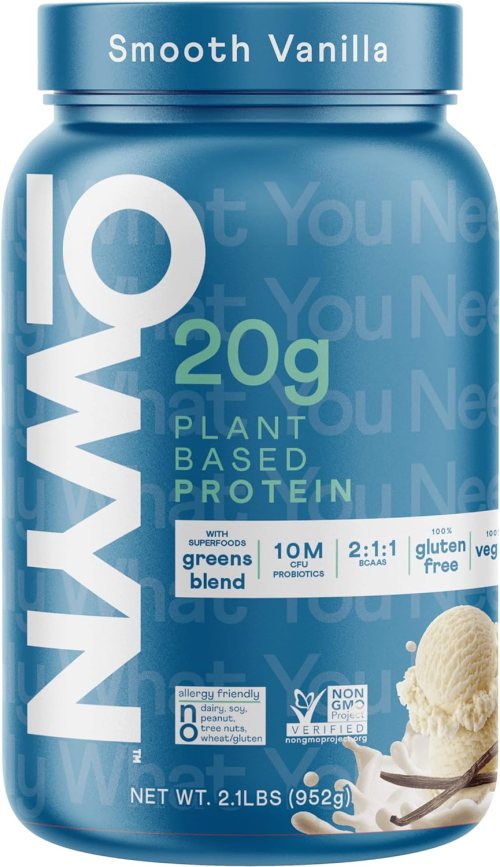
Best allergy-friendly vegan protein powder: OWYN Plant Protein Powder — $30.00
OWYN, which stands for “Only What You Need,” offers just that in its signature plant-based protein powder. Not only does this GMO-free vegan protein offer plenty of protein (20 grams per serving thanks to pea, pumpkin, and chia) but it also includes powdered greens and probiotics for an added nutritional boost. But what really sets this option apart is that it’s certified allergy friendly, meaning it doesn’t contain dairy, soy, peanuts, tree nuts, wheat, or gluten. This is a huge perk for folks with a lot of allergies or sensitivities. With nearly 1200 five-star reviews on the OWYN website alone, it’s clear that folks can’t get enough of this delicious vegan protein powder.
The downside: This protein powder has cane sugar and monk fruit extract, which can be too sweet for some taste buds. It also has 4 grams of added sugar per serving. Otherwise, it blends easily with water without resulting in a grainy mess.
- Size: 16.8 ounces (about 14 servings)
- Serving size: 2 scoops
- Protein per serving: 20 grams
- Flavors: Smooth Vanilla, Chocolate, Cookies and Creamless
Pros
- Free of all major allergens
- Contains BCAAs, probiotics, and superfood greens
Cons
- Contains cane sugar
- No third-party testing or verification; not organic
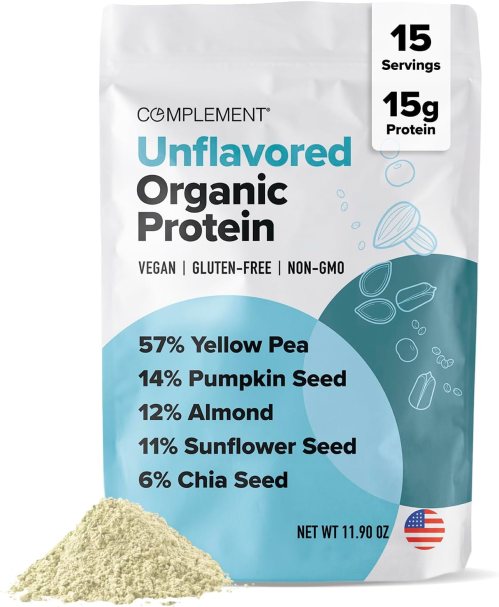
Best unflavored vegan protein powder: Complement Unflavored Organic Protein — $30.00
For a no-frills, straightforward protein powder with a short, recognizable ingredients list, look no further than Complement’s unflavored organic protein powder. I personally love this product as the ingredients are all plant-based proteins—almond, chia seed, pumpkin seed, sunflower seed, and yellow pea—and literally nothing else. (Not even sugar or sweeteners!) Sure, greens powders, adaptogens, and probiotics are nice, but sometimes you just want a product to accomplish one job, and this powder does just that. It doesn’t taste chalky or sweet, either, making it one of the most versatile options on this list.
Complement also is really into transparency, which is why it posts its third party testing results right on its website so anyone can read it. It’s also USDA Certified Organic and made in the U.S. However, while it’s soy free, it’s not safe for people who have nut allergies.
- Size: 11.90 ounces (15 servings), 23.81 ounces (30 servings)
- Serving size: 3 tablespoons
- Protein per serving: 15 grams
- Flavors: Unflavored
Pros
- Contains only plant-based protein ingredients
- Third-party tested for heavy metals and potency that you can view online
- Partners with Food for Life to provide plant-based meals to children in need with every purchase
- The company invests in sustainability through purchasing carbon offsets and using compostable packaging
Cons
- Not safe for people with nut allergies
- Lower protein per serving than other options on this list
ThirdLove Just Launched Bras That Help Balance Your Body Temperature—Here’s Why That’s a Game-Changer for Women in All Life Stages

These Are the Only Types of Underwear You Should Be Wearing, According to Gynecologists

These Are the Summer Essentials You Should Bring With You Every Time You Leave the House, According to a Derm and an RD

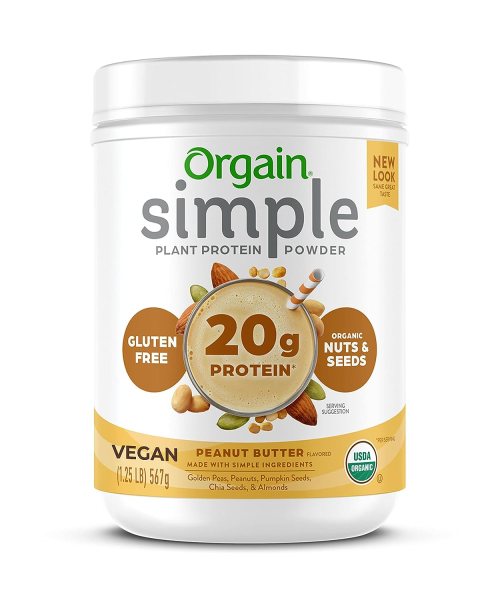
Best for protein powder newbies: Orgain Simple Organic Plant-Based Protein Powder — $30.00
Orgain is a great starter protein brand because it can be found in many grocery and convenience stores. While the brand’s OG plant-based powder has a lot more “mystery” ingredients than I’d prefer (such as thickeners and artificial sweeteners), I like the pared-down version better. Orgain’s Simple Organic Plant Based Protein Powder has a significantly shorter ingredient list and no artificial sweeteners. Its main protein source is a blend of pea protein, peanut flour, pumpkin seed, almond protein, and chia. And it tastes great, too: it has a creamy texture without grit, subtly sweet notes, and minimal aftertaste. It’s also certified organic, non-GMO, and kosher.
Just keep in mind that this vegan protein powder has five grams of added sugar, which is on the higher end of what I typically recommend consuming. And steer clear if you have a nut allergy.
- Size: 20 ounces (15 servings)
- Serving size: 2 scoops
- Protein per serving: 20 grams
- Flavors: Creamy Chocolate, Vanilla, Peanut Butter
Pros
- Short ingredient list
- No artificial sweeteners
- Kosher
Cons
- Has added sugar and peanuts (a major allergen)
- No third-party purity testing
Sign up for the Well+Good SHOP Newsletter
Get exclusive deals on wellness, beauty, fitness, and food products that have been hand-picked by our editors.
Got it, you've been added to our email list.







